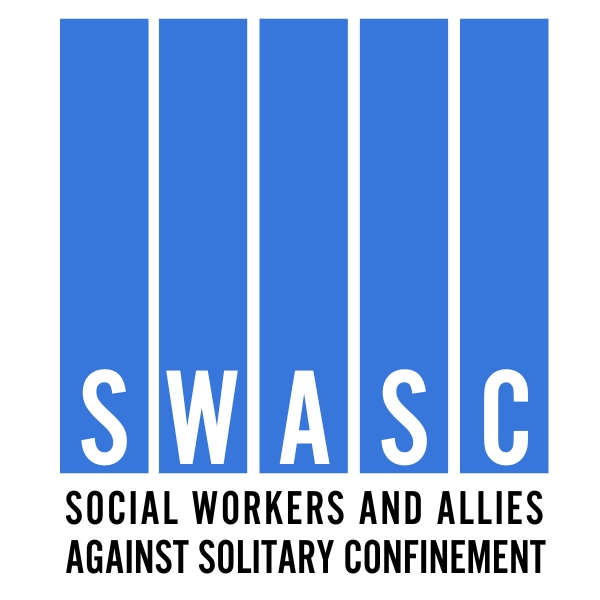The Ethics of Social Work and Dual Loyalty in Solitary Confinement Settings: NASW's Institutional Responsibility
In spite of growing opposition to the use of solitary confinement and the ethical dilemmas faced by social workers working in penal settings the National Association of Social Workers refuses to condemn the practice or even explore the issue with NASW members of SWASC.
Solitary Confinement and its Impact
Solitary Confinement, variously known as Administrative Segregation (AdSeg), Security Housing Unit (SHU), prolonged isolation, is a system of punishment that creates or exacerbates mental illness. Social workers, and other mental health professionals, employed in detention facilities are asked to provide treatment for those forced to live in solitary confinement. They are asked to collude in the fiction that meaningful mental health services/treatment can be provided to those living in a milieu which causes, reinforces and exacerbates mental illness.
Social Workers Against Solitary Confinement Concerns
SWASC is concerned that social workers working in solitary confinement settings often are forced to be complicit in the creation and development of mental illness in their clients. They struggle with issues of conflicting loyalties to their employers and their clients.
What the NASW Could Do
SWASC believes that professional organizations such as the National Association of Social Workers (NASW) should provide support to individual members exercising their ethical responsibilities, actively seek out organizational decision makers to eliminate the use of solitary confinement as a form of punishment and support the use of physical containment only in cases in which an individual presents a danger to self or others and only for periods not to exceed 8 hours.
Petitioning the NASW Board of Directors
To that end in January 2016 SWASC petitioned the NASW Board of Directors
to take six specific actions in opposition to solitary confinement consistent with the NASW Code of Ethics and the International Policy on Human Rights in Social Work Speaks.
The six proposed actions:
Endorse by resolution statements of United Nations Special Rapporteur Juan Mendez on Torture and Other Cruel Inhumane and Other Degrading Treatment
Establish a committee to address legal and ethical issues of social workers in facilities where solitary confinement exists
Develop and publicize a statement opposing solitary confinement.
Include legislation relating to solitary confinement in the NASW legislative process.
Update Social Work Speaks to include education and advocacy materials regarding solitary confinement.
Direct the NASW representative to the National Commission on Correctional Health Care (NCCHC) to advocate for mandates to replace solitary confinement with humane alternatives.
NASW Response to the Petition
The board refused to support the abolition of solitary confinement based on “the complexity of the issue” but “voiced its strong opposition to the isolation of juveniles, barring extraordinary circumstances.”
In regard to the six proposed actions:
The board refused to endorse the statement of Juan Mendez, objecting to the use of the word torture in reference to solitary confinement
The NASW 12 member National Ethics Committee refused to consider the issue of solitary confinement.
The NASW Board refused to establish a committee or commission to consider the issue.
A statement opposing solitary confinement has not been developed.
The NASW has not been involved in legislation related to solitary confinement.
The “solitary confinement” section in the revised policy on Criminal Justice for Social Work Speaks is inadequate.
SWASC is not aware of NASW's representative to NCCHC working to establish Mandates as opposed to Guidelines in its Standards and Position Statement.
What Next?
Nearly two years have passed since the NASW Board refused to acknowledge that solitary confinement is torture and refused to support its abolition. Is it time to petition the board once again?
If you would like to be part of the development of a new petition to the board and/or alternative strategies, please contact SWASCnewsletter@gmail.com
